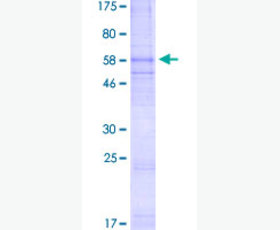Recombinant Mouse TWEAK Receptor/TWEAK R/TNFRSF12A
| Product name: | Recombinant Mouse TWEAK Receptor/TWEAK R/TNFRSF12A |
| Source: | Human Cells |
| Purity: | Greater than 95% as determined by reducing SDS-PAGE. |
| Buffer Formulation: | Lyophilized from a 0.2 μm filtered solution of PBS,pH7.4. |
| Applications: | Applications:SDS-PAGE; WB; ELISA; IP. |
| Storage: | Avoid repeated freeze/thaw cycles. Store at 2-8 oC for one month. Aliquot and store at -80 oC for 12 months. |
| UOM: | 100ug/50ug/200ug/1mg/1g |
SourceHuman CellsDescriptionRecombinant Mouse TWEAK Receptor is produced by our Mammalian expression system and the target gene encoding Glu28-Trp79 is expressed with a Fc tag at the C-terminus.NamesTumor necrosis factor receptor superfamily member 12A,Fibroblast growth factor-inducible immediate-early response protein 14,Fibroblast growth factor-regulated protein 2,Tweak-receptor,TweakR,TNFRSF12Accession #Q9CR75FormulationLyophilized from a 0.2 μm filtered solution of PBS,pH7.4.ShippingThe product is shipped at ambient temperature.
ReconstitutionAlways centrifuge tubes before opening. Do not mix by vortex or pipetting.
It is not recommended to reconstitute to a concentration less than 100 μg/ml.
Dissolve the lyophilized protein in ddH2O.
Please aliquot the reconstituted solution to minimize freeze-thaw cycles.StorageLyophilized protein should be stored at < -20°C, though stable at room temperature for 3 weeks.
Reconstituted protein solution can be stored at 4-7°C for 2-7 days.
Aliquots of reconstituted samples are stable at < -20°C for 3 months.PurityGreater than 95% as determined by reducing SDS-PAGE.
EndotoxinLess than 0.1 ng/µg (1 IEU/µg) as determined by LAL test.Amino Acid Sequence
ReconstitutionAlways centrifuge tubes before opening. Do not mix by vortex or pipetting.
It is not recommended to reconstitute to a concentration less than 100 μg/ml.
Dissolve the lyophilized protein in ddH2O.
Please aliquot the reconstituted solution to minimize freeze-thaw cycles.StorageLyophilized protein should be stored at < -20°C, though stable at room temperature for 3 weeks.
Reconstituted protein solution can be stored at 4-7°C for 2-7 days.
Aliquots of reconstituted samples are stable at < -20°C for 3 months.PurityGreater than 95% as determined by reducing SDS-PAGE.
EndotoxinLess than 0.1 ng/µg (1 IEU/µg) as determined by LAL test.Amino Acid Sequence
EQAPGTSPCSSGSSWSADLDKCMDCASCPARPHSDFCLGCAAAPPAHFRLLWVDDIEGRMDEPKS CDKTHTCPPCPAPELLGGPSVFLFPPKPKDTLMISRTPEVTCVVVDVSHEDPEVKFNWYVDGVEV HNAKTKPREEQYNSTYRVVSVLTVLHQDWLNGKEYKCKVSNKALPAPIEKTISKAKGQPREPQVY TLPPSREEMTKNQVSLTCLVKGFYPSDIAVEWESNGQPENNYKTTPPVLDSDGSFFLYSKLTVDK SRWQQGNVFSCSVMHEALHNHYTQKSLSLSPGK
BackgroundTumor necrosis factor receptor superfamily member 12A(Tnfrsf12a) is a single-pass type I membrane protein and contains 1 TNFR-Cys repeat. It is weak inducer of apoptosis in some cell types.It promotes angiogenesis and it is the proliferation of endothelial cells. It may modulate cellular adhesion to matrix proteins.TNFR binds specifically to tumor necrosis factor (TNF) and blocks its interaction with cell surface TNF receptors. TNF is a naturally occurring cytokine that is involved in normal inflammatory and immune responses. It plays an important role in the inflammatory processes of rheumatoid arthritis (RA), polyarticular-course juvenile rheumatoid arthritis (JRA), and ankylosing spondylitis and the resulting joint pathology. In addition, TNF plays a role in the inflammatory process of plaque psoriasis. Elevated levels of TNF are found in involved tissues and fluids of patients with RA, psoriatic arthritis, ankylosing spondylitis (AS), and plaque psoriasis. Two distinct receptors for TNF (TNFRs), a 55 kilodalton protein (p55) and a 75 kilodalton protein (p75), exist naturally as monomeric molecules on cell surfaces and in soluble forms. Biological activity of TNF is dependent upon binding to either cell surface TNFR.













